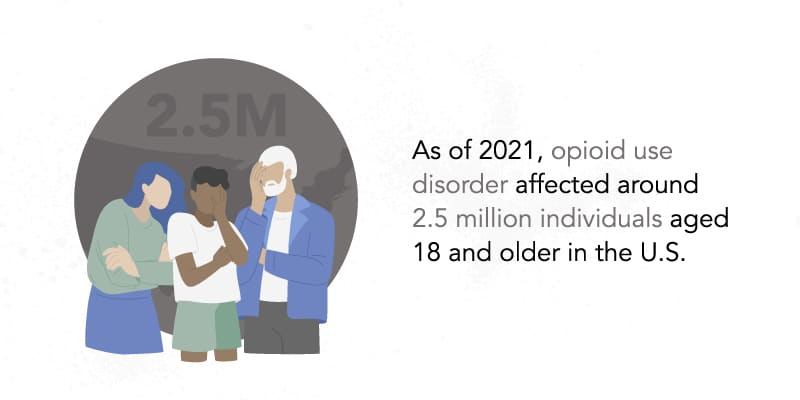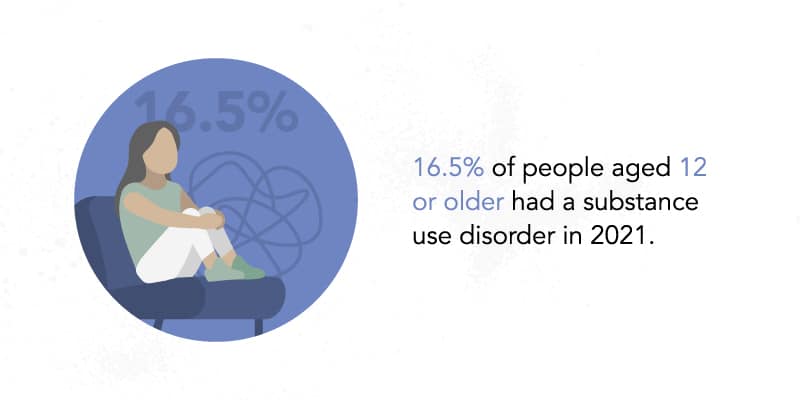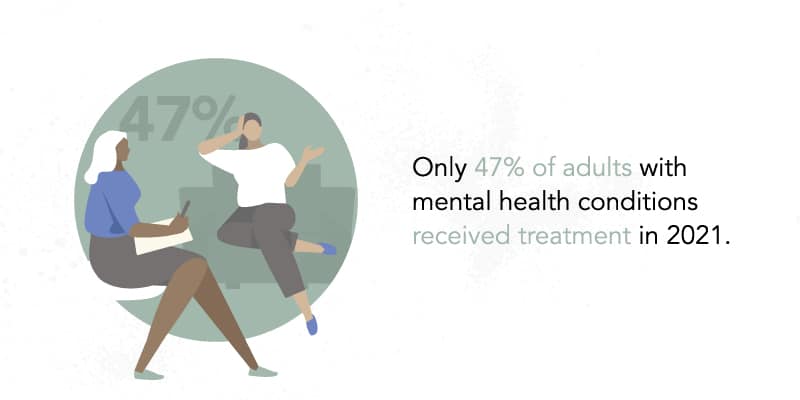What is an Intensive Outpatient Program (IOP)?
What is an Intensive Outpatient Program (IOP)?
An intensive outpatient program (IOP) is a type of treatment program that provides people with intensive therapy and support for their mental health or substance use disorder concerns. It allows them to receive the care they need while still living at home.

The Need for an IOP
The prevalence of mental illness among U.S. adults is significant, with more than 20% of people being affected.1 Additionally, in 2021, over 46 million Americans aged 12 and above grappled with substance use disorders.2
IOP provides a structured and comprehensive approach to recovery. It offers a step-down level of care for those who have completed a higher level of treatment, such as inpatient or residential programs. It allows people to receive intensive therapy and support while still maintaining their routines.
Primary Goals Of an Intensive Outpatient Program
Assess and Stabilize
- Looking at their substance use or mental health issues
- Diagnosing any other conditions
- Developing a treatment plan
Teach and Build Skills
- Spot and manage their triggers
- Develop healthy ways to cope
- Make good choices for their recovery
Prevent Relapse
Relapse rates in substance use disorders can reach 60%. That’s why preventing a return to substance use is important in an IOP. They teach people skills to stay sober or manage their mental health.3
Intensive outpatient programs offer ongoing support to avoid going back to old behaviors.
- Spotting early warning signs
- Making a plan to prevent a relapse
- Building a strong support system
- Dealing with things that might cause stress
Heal Emotionally and Mentally
- Talk about their feelings
- Understand their emotions better
- Learn healthier ways to cope
Encourage Personal Growth and Empowerment
Intensive outpatient programs aim to challenge these negative thoughts and help people take control of their lives. They encourage self-reflection, setting personal goals, and learning life skills. This helps with personal growth and long-term recovery.
Promote Social Integration and Support
- Connect
- Build supportive relationships
- Create a strong support network
Criteria for Eligibility for Participation in an Intensive Outpatient Program?
Clinical Assessment
Before people can join an IOP, a comprehensive clinical assessment, including adult psychiatric assessments, is conducted. This assessment helps determine the severity and nature of the person’s condition. It also helps identify any co-occurring disorders or medical conditions that may need specialized care.
Diagnosis and Treatment History
- Outpatient counseling
- Therapy sessions
- Inpatient treatment
Level of Functioning
- Take part in group therapy sessions
- Communicate with others
- Engage in activities that promote their recovery
Commitment and Motivation
- Attend therapy sessions regularly
- Complete assigned homework or worksheets
- Actively take part in the therapeutic process
Stability and Support System
- A stable living environment
- Reliable transportation
- Ability to meet their basic needs
Safety Considerations
- Active suicidal thoughts
- A history of violent behavior that may put others at risk

Key Components and Services Offered in an Intensive Outpatient Program
Intensive outpatient programs address the physical, psychological, and emotional aspects of a person’s condition. Here are some key components and services often offered in an IOP:
Dialectical Behavioral Therapy (DBT)
- Manage difficult emotions
- Improve relationships
- Cultivate mindfulness
What Does DBT Treat?
- Emotional dysregulation
- Self-destructive behaviors
- Interpersonal conflicts
A Closer Look at DBT
Psychodynamic Therapy
Psychodynamic therapy focuses on exploring unconscious patterns. It addresses unresolved conflicts that may contribute to a person’s present behaviors and emotions.
- Explore their past experiences
- Analyze their thoughts and feelings
- Promote healing and personal growth
Addiction Education
Addiction education provides participants with information about the nature of addiction. In an intensive outpatient program, these sessions empower patients to make informed decisions.
- The disease model of addiction
- Relapse prevention strategies
- The benefits of ongoing support after treatment
Family System Approach to Treatment
Addiction and mental health disorders affect both the individual and their loved ones. In an IOP, family therapy sessions are offered to help repair and strengthen family relationships.
Motivational Interviewing (MI)
- Explore and resolve their ambivalence toward recovery
- Identify and enhance their personal motivations
- Set achievable goals
Harm Reduction Techniques
- Providing information on safer drug use practices
- Distributing clean needles
- Offering education on overdose prevention
How Does an IOP Address Both the Physical and Psychological Aspects of Addiction and Recovery?
Intensive outpatient programs combine medical interventions and therapy. The aim is to help people overcome substance abuse and achieve long-term recovery.
Physical Healing through Medical Interventions
Detoxification
Intensive outpatient programs provide supervised detoxification to manage withdrawal symptoms safely. Medical professionals check on and assist patients during this process. This ensures their safety and comfort.
Medication-Assisted Treatment (MAT)
Certain medications can help reduce and manage withdrawal symptoms. These programs incorporate MAT into their treatment plans to support people in their recovery journey.
A Closer Look at MAT
Regular Health Monitoring
- Checking vital signs
- Conducting blood tests
- Managing any health concerns
Psychological Healing through Therapy
Individual Therapy
Group Therapy
These sessions enable patients to interact with peers on the road to recovery. Through shared experiences and mutual support, participants learn from one another. As a result, healthy relationships are built, and a sense of belonging is developed.
Cognitive-Behavioral Therapy (CBT)
How Does CBT Work?
Relapse Prevention Strategies and Coping Skills in Intensive Outpatient Programs
Personalized Assessment
Identifying Triggers
Developing Coping Skills
- Mindfulness techniques
- Breathing exercises
- Assertiveness training
- Problem-solving
- Stress management
Developing Healthy Habits
- Adopting a balanced diet
- Regular exercise routine
- Quality sleep patterns
- Practicing self-care activities
Distraction Techniques
- Engaging in a hobby
- Practicing mindfulness
- Exercising
- Listening to music

Assessing Progress and Adjust Treatment in an Intensive Outpatient Program
Treatment Goals
Regular Progress Monitoring
Assessment Tools
- Self-reported substance use inventories
- Mental health assessments
- Quality-of-life questionnaires
Drug Testing
Family and Peer Feedback
Client Feedback and Participation
Addressing Co-Occurring Mental Health Conditions in an Intensive Outpatient Program
Co-occurring mental health conditions are common among people with substance use disorders. In fact, 9.2 million adults suffer from co-occurring disorders as of 2021.5
Dual-Diagnosis Specialists
Customized Treatment Plans
- Individual therapy
- Group therapy
- Other psychiatric services as needed
Medication Management
Coordinated Care
Dual-Focused Therapy
Therapy sessions in an IOP often integrate dual-focused approaches. Cognitive-behavioral therapy, dialectical-behavior therapy, and motivational enhancement therapy are commonly used to address both substance use and mental health issues.
Challenges and Barriers to Accessing and Delivering Intensive Outpatient Program Services
Stigma Surrounding Substance Use Disorders
One significant barrier is the stigma associated with substance use disorders. Many people may avoid seeking help due to fear of judgment or discrimination.
Lack of Insurance Coverage
Waitlists and Capacity Issues
Language and Cultural Barriers
Lack of Awareness
Continuity of Care

Navigating the Process of Finding and Choosing the Right Intensive Outpatient Program
Assessing Individual Needs
- The severity of the substance use disorder
- Co-occurring mental health conditions
- Unique preferences or needs
Consulting Healthcare Professionals
Reading Reviews and Testimonials
Visiting Intensive Outpatient Program Facilities
- Assess the environment
- Meet the staff
- Get a feel for the program
Evaluating Program Length and Schedule
- Work
- School
- Family commitments
Assessing Costs and Insurance Coverage
- Costs
- Payment options
- Whether the program accepts insurance

Attending an Intensive Outpatient Program at Ethos Wellness
Dialectical Behavioral Therapy Intensive Outpatient Program
Our dialectical behavioral therapy IOP is designed for people looking to improve their emotional regulation skills.
DBT is an evidence-based therapy that’s beneficial for managing intense emotions, mood disorders, and impulsivity. With our DBT IOP, clients will learn valuable skills to manage emotions and reduce self-destructive behaviors.
Mental Health Intensive Outpatient Program
Our mental health IOP is tailored to provide comprehensive support for various mental health concerns. Whether a person is dealing with depression, anxiety, trauma, or other mental health challenges, this program is designed to help.
- Develop coping strategies
- Enhance your emotional well-being
- Achieve a better quality of life
Substance Use Disorder Intensive Outpatient Program
For those seeking recovery from substance use disorders, our substance use disorder IOP provides valuable support. This program offers structured guidance to help maintain sobriety and make positive life changes.
Eight-Week Tracks for Lasting Change
A Holistic Approach
Experienced and Caring Team
Our team of mental health professionals is dedicated to client’s well-being. We have the experience and expertise to guide people on their journey to mental wellness. Clients can expect compassionate and non-judgmental support from our team.
Take Your First Step Toward Better Mental Health with Ethos Wellness
Contact us today to begin your journey to a healthier and happier life. You don’t have to go through it alone; we’re here to help you every step of the way.
Resources
- https://www.nimh.nih.gov/health/statistics/mental-illness
- https://www.aha.org/news/headline/2023-01-06-survey-most-americans-substance-use-disorders-dont-receive-treatment
- https://substanceabusepolicy.biomedcentral.com/articles/10.1186/s13011-021-00347-0
- https://www.ncbi.nlm.nih.gov/pmc/articles/PMC2897895/
- https://www.samhsa.gov/medications-substance-use-disorders/medications-counseling-related-conditions/co-occurring-disorders
- https://www.ncbi.nlm.nih.gov/books/NBK384923/


